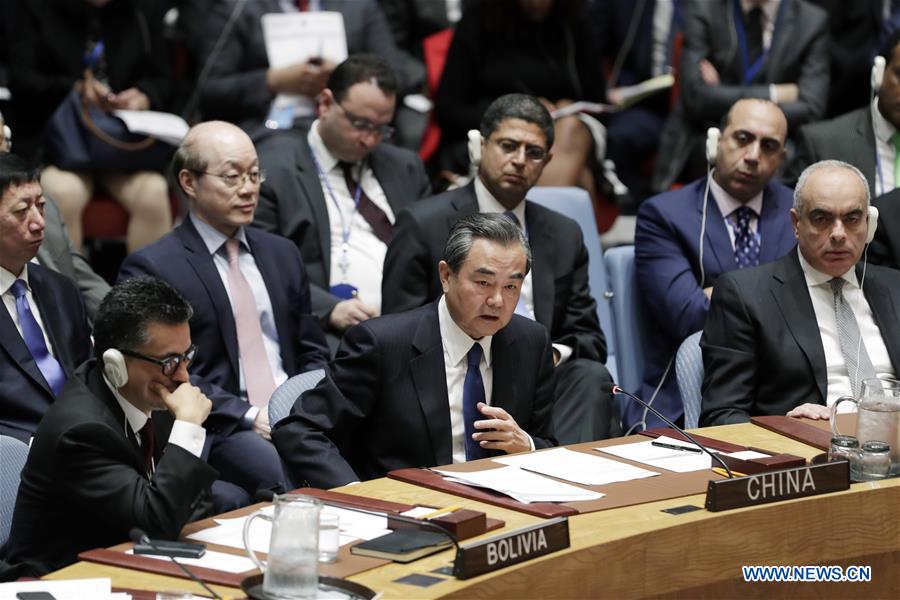
Chinese Foreign Minister Wang Yi (C F) speaks during a ministerial meeting of the UN Security Council on the nuclear issue of the Korean Peninsular, at the UN headquarters in New York April 28, 2017. (Xinhua/Li Muzi)
UNITED NATIONS, April 28 (Xinhua) -- Chinese Foreign Minister Wang Yi on Friday stressed two directions in dealing with the nuclear issue on the Korean Peninsula, at the UN Security Council Ministerial Meeting on the Non-Proliferation/the Democratic People's Republic of Korea (DPRK).
Addressing the meeting, Wang said that "we must stay committed to the goal of denuclearization."
"All parties should comprehensively understand and fully implement DPRK-related Security Council resolutions," he said.
The foreign minister said that denuclearization is the basic precondition for long-term peace and stability on the peninsula and "what we must accomplish to safeguard the international nuclear non-proliferation regime."
The Security Council held a special meeting Friday to discuss the Korean Peninsula nuclear issue. UN Secretary-General Antonio Guterres briefed the meeting, which was chaired by U.S. Secretary of State Rex Tillerson, whose country holds the rotating presidency of the Security Council this month.
Wang and foreign ministers or vice foreign ministers of Britain, Russia, Senegal and Japan, attended the meeting.
"The continued escalation of tensions on the Korean Peninsula in the recent period has caused widespread concerns and worries of the international community," said Wang.
"If the issue of the Peninsula fails to be put under effective control and in the case of unexpected events, the situation is highly likely to take a drastic turn for the worse and spiral out of control," he added.
All the 15 members of the Security Council addressed the Security Council focusing on the nuclear issue on the Korean Peninsula and the implementation of relevant UN resolutions.
South Korean media said that on Saturday morning, the DPRK testfired a mid-range ballistic missile that apparently failed shortly after launch.
At the UN Security Council special meeting, Wang stressed in his address the significance of continued commitment to dialogue and negotiation on the nuclear issue on the Korean Peninsula.
"We must stay committed to the path of dialogue and negotiation," the Chinese foreign minister said.
"The use of force does not resolve differences, and will only lead to bigger disasters," Wang noted, adding that "as the only way out, dialogue and negotiation also represent the sensible choice for all parties."
"Our past experience of resolving the nuclear issue on the Peninsula shows, whenever dialogue and negotiation were ongoing, the situation on the Peninsula would maintain basic stability and efforts toward denuclearization could make progress," said the minister.
He recalled the five years between 2003 and 2007 when the parties were engaged in dialogue and negotiation, and three joint documents were adopted, noting "In particular, the September 19th Joint Statement in 2005 set out the roadmap for the DPRK's abandonment of all nuclear programs and the realization of peace on the Peninsula."
"Even today, the Joint Statement still carries major positive significance, and has been reaffirmed and acknowledged by all DPRK-related resolutions of the Security Council," Wang said.
Noting that China is not a focal point of the problem on the Peninsula, Wang noted that "the key to solving the nuclear issue on the Peninsula does not lie in the hands of the Chinese side."
"China has over the years made unremitting efforts and played a unique role in promoting a negotiated solution of the issue," said Wang, adding that "it was through China's efforts and the support of all parties that the Three-Party Talks on the Peninsula nuclear issue was expanded to the Six-Party Talks."
"Under the current circumstances, China is still prepared to work with all parties to make new contributions to the resolution of the nuclear issue on the Peninsula," the minister stressed.
In his address to the meeting, Guterres warned that armed conflict in Northeast Asia "would have global ramifications."
"We must act now to prevent conflict and achieve sustainable peace," he told the open meeting.
Guterres condemned "in the strongest terms" the repeated violations of the relevant Security Council resolutions by the DPRK.
Echoing the UN chief, the Chinese foreign minister said that "we urge the DPRK to stop its nuclear and missile development activities, come back to its commitment of denuclearization and honor its denuclearization obligations."
The minister also called on all parties to remain calm and exercise restraint and avoid provocative rhetoric or actions that would lead to miscalculation.
Tillerson opened the meeting with a statement calling on all member states to enforce the existing sanctions, halt or downgrade diplomatic relations with the DPRK, and increase the country's isolation with new sanctions and with a tightening of existing measures.
He said that all options would remain on the table to counter the DPRK action with military action if necessary.
On Saturday, the DPRK test-fired a ballistic missile, which exploded shortly after liftoff, according to South Korea's Yonhap news agency.
It conducted a hydrogen bomb test and a nuclear warhead explosion test on Jan. 6 and Sept. 9 of 2016, respectively. The Security Council adopted resolutions on March 2 and Nov. 30 of 2016, respectively, demanding that the DPRK abandon its nuclear weapon and missile programs and imposing sanctions on it.



